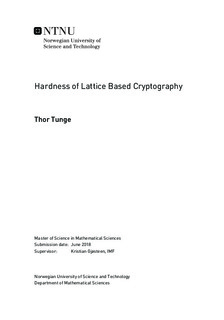Hardness of Lattice Based Cryptography
Master thesis
Permanent lenke
http://hdl.handle.net/11250/2557939Utgivelsesdato
2018Metadata
Vis full innførselSamlinger
Sammendrag
In this thesis we will discuss hard computational problems in lattice theory and relate them to cryptographic constructions. Many of these problems enjoy average-case hardness which makes them attractive for cryptography. In addition, lattice based cryptography is a candidate for post-quantum cryptography, as there is no known quantum algorithm which breaks various hardness theorems.
We build a foundation in algebraic number theory to have the required background to discuss schemes based on discrete algebraic structures. These structures are free Z-modules which permits unique factorization in prime ideals. We relate this algebraic number theory to lattices in R^n so we can use the theory from algebra to our advantage.
We then define some standard hard computational lattice problems and show how many of these are related to each other. We prove that these problems are at least as hard as finding the shortest vector of a lattice, which we conjecture is computationally infeasible. We then prove a quantum reduction the learning with errors problem, a problem in machine learning . We also show that there is a similar reduction for a variant of this problem over more general rings.
